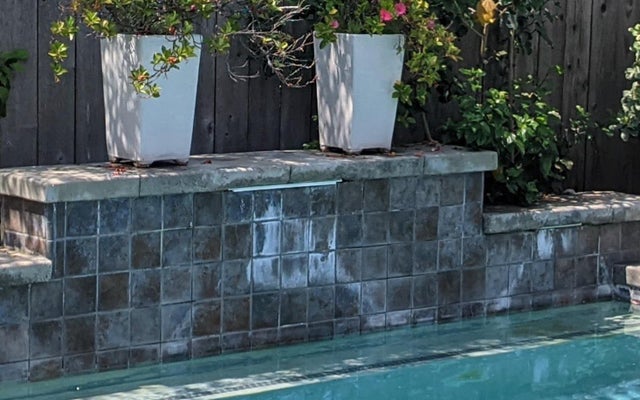Is your home starting to look a little dull? Are there white spots on your windows or doors? This could be calcium deposits, and while they may not seem like a big deal, they can actually cause some serious damage to your home.
Pressure washing is one of the best ways to remove calcium deposits, but you need to be careful. Use too much pressure and you could end up damaging your siding or window frames.
- Fill a pressure washer with a calcium deposit removal solution
- Place the tip of the pressure washer on the calcium deposit and turn on the machine
- Allow the machine to run for several minutes before moving it to another area
- Rinse off the area with clean water once the deposits have been removed
Pressure Wash Pool Without Draining
If you have a pool, you know that keeping it clean is important. But sometimes, pressure washing your pool can seem like a daunting task. After all, you don’t want to damage your pool or cause any harm to yourself or your family.
Luckily, there are ways to pressure wash your pool without draining it. Here’s how: First, make sure that you have the required equipment.
You’ll need a pressure washer with a hose attachment and an adjustable nozzle. Next, fill up your pressure washer with water and add some mild soap or detergent. Now it’s time to start pressure washing!
Begin by spraying the walls of your pool with the nozzle set to a low setting. Work your way around the entire pool, using circular motions. Once you’ve gone over the entire pool, increase the pressure on the nozzle and spray down the stairs and other areas that may need a deeper cleaning.
When you’re finished pressure washing, simply turn off the machine and let all of the water drain out into your backyard. Your pool will be sparkling clean – without having to drain any water!
Best Way to Clean Calcium off Pool Tile
If your pool tile is starting to look a little bit dull and you can see calcium deposits, it’s time to give it a good cleaning. Here are the best ways to clean calcium off pool tile:
Use a pumice stone
Pumice stones are great for getting rid of calcium deposits. Just wet the pumice stone and rub it over the affected areas.
Use vinegar or lemon juice
Vinegar and lemon juice are both acidic, so they can help to break down calcium deposits. Just apply them to the affected areas with a cloth and let them sit for a few minutes before scrubbing with a brush.
Use a commercial cleaner specifically designed for pool tile
You can find these cleaners at most pool supply stores or online retailers specializing in pool supplies. Be sure to follow the directions on the cleaner’s label carefully, as some cleaners require you to dilute them with water before use while others should be used full strength.
Pressure Wash Pool Tile Calcium
If your pool tile is looking dull and dirty, it may be time for a pressure wash. Pressure washing pool tile can remove calcium deposits and other build-up that can occur over time. This type of cleaning is typically done with a high-pressure washer, which uses water to blast away dirt and grime.
Before pressure washing your pool tile, it’s important to take some safety precautions. Make sure the area around your pool is clear of debris and furniture that could be blown around by the high-pressure water. Also, wear goggles or glasses to protect your eyes from flying debris.
Once you’re ready to pressure wash your pool tile, start by wetting down the area with a hose or low-pressure setting on your washer. This will help prevent damage to the tile from the high-pressure water. Then, move the wand in a back-and-forth motion across the surface of the tile.
Be sure to overlap each stroke so you don’t miss any spots.
After you’ve pressure washed all of the pool tile, rinse off any remaining cleaner with a hose or low-pressure setting on your washer. Then enjoy your sparkling clean pool!
Pressure Washer
A pressure washer is a machine that uses high-pressure water to remove dirt, grime, and other build-up from surfaces. Pressure washers can be used on a variety of surfaces, including concrete, brick, wood, metal, and vinyl. They are often used to clean driveways, sidewalks, decks, and patios.
Pressure washers are available in a variety of styles and sizes. Some pressure washers are small enough to be carried by one person, while others are larger and require two people to operate them. The size of the pressure washer will dictate the amount of water it can hold and the amount of pressure it can generate.
Medium Pressure Washer
If you’re looking for a powerful pressure washer that can handle even the toughest jobs, then you’ll want to consider a medium pressure washer. These types of pressure washers are perfect for cleaning driveways, sidewalks, decks, patios and more. And, because they’re so versatile, they can be used for both residential and commercial applications.
When choosing a medium pressure washer, it’s important to consider the pump type and flow rate. The pump is what powers the unit and determines how much water pressure is generated. The flow rate indicates how much water the unit can output per minute.
Higher flow rates mean faster cleaning times.
Another key consideration is hose length. A longer hose will give you more reach, making it easier to clean larger areas.
Finally, make sure to choose a model with adjustable pressure settings. This way, you can tailor the power of the unit to your specific cleaning needs.
Whether you’re looking to power wash your deck or clean up your business property, a medium pressure washer can get the job done quickly and efficiently.
With so many different models on the market today, it’s easy to find one that’s perfect for your needs.

Credit: texasstonesealers.com
Can You Pressure Wash Calcium Deposits off Pool Tile?
Yes, you can pressure wash calcium deposits off pool tile. However, it is important to note that there are a few things you need to do in order to avoid damaging the tile. First, make sure that the pressure washer is set to a low setting.
Second, hold the nozzle about 12 inches away from the surface of the tile. Finally, move the nozzle in a circular motion while applying even pressure.
What Will Dissolve Calcium Deposits?
There are a few things that can dissolve calcium deposits, but they vary depending on the severity of the deposit. For small deposits, something as simple as vinegar or lemon juice can do the trick. Just apply either one of these to the area with a cloth and let it sit for a few minutes before wiping away.
If you have a larger deposit, you may need to use a little elbow grease and scrub it with a brush. For really tough calcium deposits, you can try using diluted hydrochloric acid. This is obviously more dangerous to use so be sure to take all the necessary precautions (wear gloves, eye protection, etc.) and neutralize the area afterwards with baking soda or another alkaline substance.
Can I Use a Pressure Washer to Clean My Pool?
If you are considering using a pressure washer to clean your pool, there are a few things you should know first. Pressure washers can be a great way to quickly and easily clean your pool, but they can also damage the surface of your pool if used incorrectly. Here is what you need to know about using a pressure washer to clean your pool:
The first thing to consider is the pressure of the pressure washer. If the pressure is too high, it can damage the surface of your pool. The best way to avoid this is to use a low-pressure setting on your pressure washer.
This will minimize the risk of damaging your pool while still getting it clean.
Another thing to keep in mind is that pressure washing can strip away any protective coatings on your pool (such as chlorine). This means that you will need to reapply these coatings after cleaning with a pressure washer.
Be sure to follow all manufacturer instructions when doing this.
Finally, remember that using a pressure washer will use more water than traditional methods like brushing or vacuuming. This means that you may need to refill your pool more often after cleaning with a pressure washer.
Keep this in mind when deciding whether or not using a pressure washer is right for you and your pool-cleaning needs.
Will Power Washing Remove Hard Water Stains?
Yes, power washing can remove hard water stains. However, the amount of pressure and type of nozzle you use will determine how successful you are at removing the stains. If the stains are particularly stubborn, you may need to use a chemical cleaner in addition to power washing.
??♂️Underwater Pressure Washing. How to Remove Calcium Deposits. #pressurewashing #summer #cleaning
Conclusion
If you have calcium deposits on surfaces around your home, you may be wondering if you can pressure wash them away. The short answer is yes, but there are a few things to keep in mind. First, make sure you use a low-pressure setting on your pressure washer, as high pressure can damage some surfaces.
Second, always test the pressure washing solution on a small area first to make sure it won’t cause any damage. And finally, be sure to rinse the area well after pressure washing to remove any residue.

